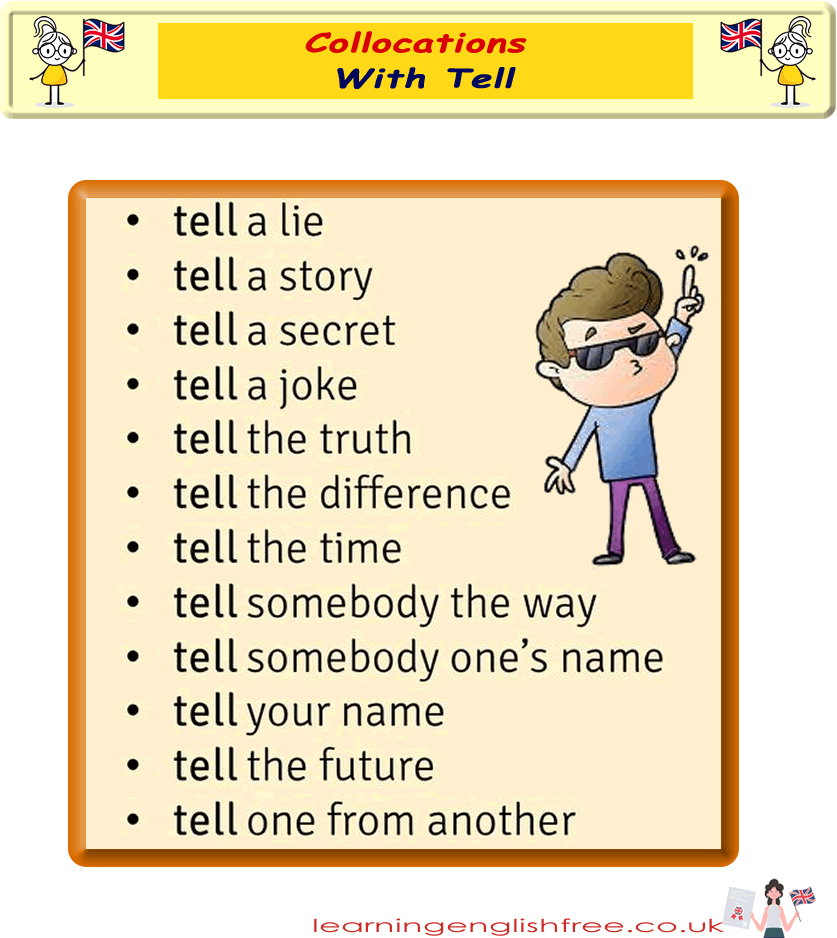
Unlocking the Power of "Tell": A Journey Through English Collocations
The verb "tell" is a cornerstone in English communication, woven intricately into the fabric of storytelling, truth-sharing, and information exchange. This lesson delves into the art of using "tell" in various contexts, unravelling the nuances of English collocations that enrich conversation and writing. Through understanding these combinations, learners will elevate their language proficiency, bridging the gap between basic communication and engaging dialogue.
Collocations with "tell" provide a window into the cultural and linguistic constructs of the English language. These expressions, ranging from "tell a lie" to "tell the future," serve as building blocks for learners to express complex ideas succinctly and effectively. By the end of this lesson, you will not only have added a range of collocations to your vocabulary but also gained insights into their proper usage, enhancing both your understanding and production of English.
This exploration begins with an introduction to key collocations involving "tell," contextualizing their meanings and demonstrating their application in everyday language. Emphasis is placed on the fluidity these phrases bring to communication, making interactions more natural and expressive. As we journey through these expressions, remember that mastering collocations is a step toward achieving fluency, allowing you to convey thoughts and stories with clarity and confidence.
Useful Vocabulary: Collocations With "Tell"
-
Tell a lie
- Meaning: To say something that is not true.
- Example: "I knew he didn't go to school yesterday; he told a lie."
-
Tell a story
- Meaning: To narrate a tale or recount events.
- Example: "Every night, my father would tell a story before bed."
-
Tell a secret
- Meaning: To reveal confidential information to someone.
- Example: "She trusted me enough to tell a secret she'd never shared before."
-
Tell a joke
- Meaning: To share a funny story or quip with the intent of making others laugh.
- Example: "He can always lift the mood by telling a joke."
-
Tell the truth
- Meaning: To speak honestly and provide factual information.
- Example: "No matter the consequences, it's important to tell the truth."
-
Tell the difference
- Meaning: To discern or distinguish between two or more things.
- Example: "Can you tell the difference between these two types of tea?"
-
Tell the time
- Meaning: To read and understand the time shown on a clock or watch.
- Example: "Children learn to tell the time in their first years of school."
-
Tell somebody the way
- Meaning: To give someone directions.
- Example: "We were lost, but a kind passerby told us the way to the station."
-
Tell somebody one's name
- Meaning: To inform someone of your name.
- Example: "When we met, she told me her name was Anna."
-
Tell your name
- Meaning: A variation of informing someone of your name.
- Example: "At the party, I had to tell my name to several new faces."
-
Tell the future
- Meaning: To predict or speak about events that have not yet happened.
- Example: "Some believe that certain cards can tell the future."
-
Tell one from another
- Meaning: To distinguish between two or more items or individuals.
- Example: "With such a subtle difference, it's hard to tell one from another."
Summary and Takeaways
Mastering the art of collocations with "tell" opens up a realm of expressive possibilities in English. From crafting compelling stories to sharing intimate secrets or guiding someone with directions, these phrases are instrumental in enhancing your linguistic repertoire. Practical exercises such as sentence formation, storytelling, and role-play can be immensely beneficial in embedding these collocations into your memory. Practising these in varying contexts will cement their meanings and usages, making your English more vibrant and authentic.
Remember, language learning is a journey of continuous exploration. Keep a notebook or digital document where you can compile new expressions, including collocations with "tell," and refer back to them regularly. Drawing pictures associated with each collocation or creating mind maps can also aid in visual learning, making the phrases more memorable.
Applying these collocations in your daily conversations or writing will not only boost your confidence but also intrigue and engage your listeners or readers. Sharing your learning experiences on platforms like our Facebook page at www.facebook.com/learningenglishfree.co.uk can inspire others and provide you with feedback and new insights. Engaging with a community of fellow learners fosters a supportive environment where everyone grows together.
